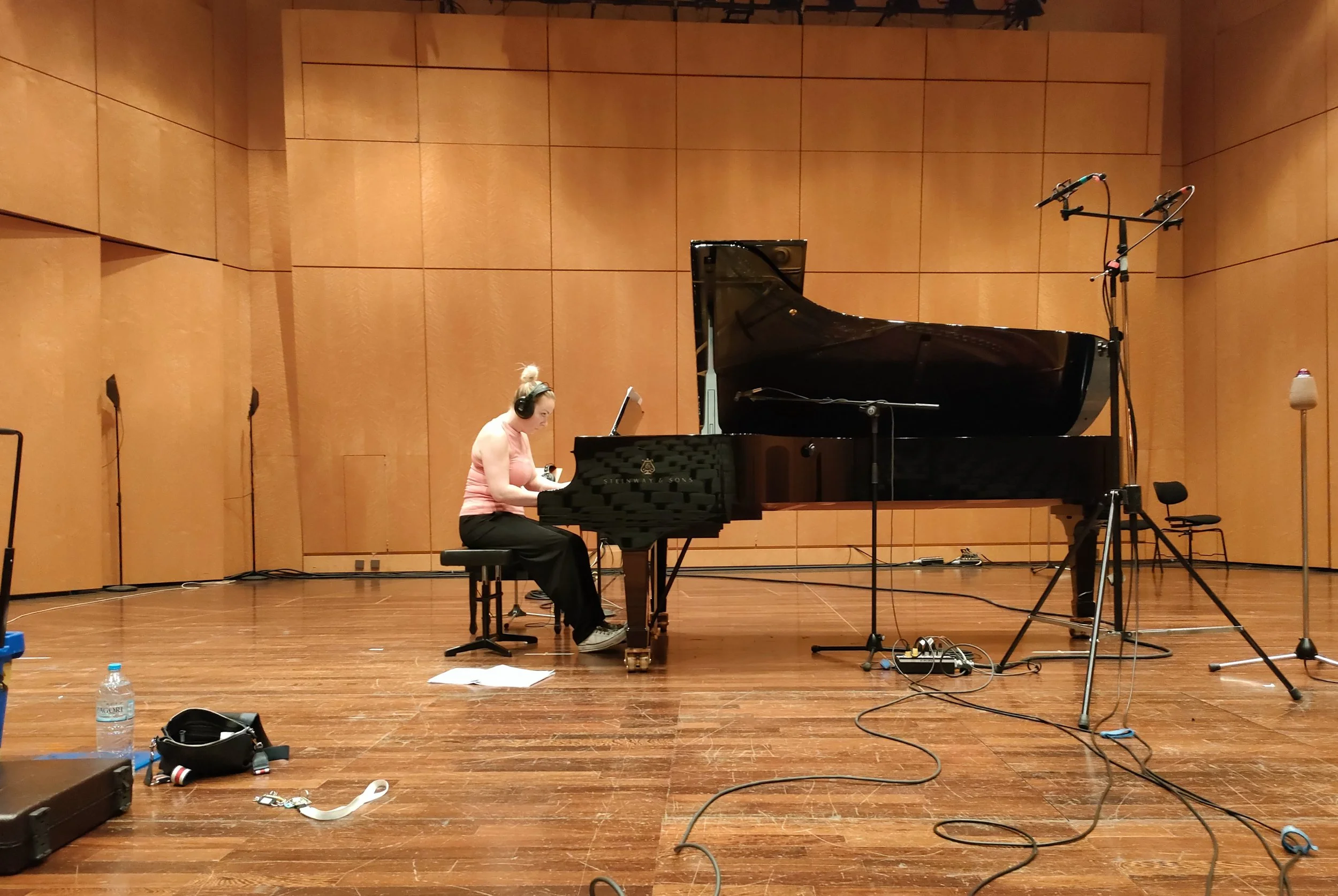John Psathas’ Voices at the End — an impressive reimagining
Album review by guest writer Raf Hosking
“You write two kinds of pieces in your career: one is, for example, a string quartet that goes into the world a string quartet and dies a string quartet—other works have the most amazing evolution… they keep changing and growing and adapting.” John Psathas
The premiere of Voices at the End at the 2020 Auckland Arts Festival was something of an artistic spectacle. Psathas assembled six of Aotearoa’s finest pianists for the occasion and they didn’t disappoint, navigating the wonderfully demanding material to deliver a breathtaking performance. Now, the six-piano epic has been adapted into a solo-piano work, released as a full-length album in March.
This new format sees pianist Dawn Hardwick’s virtuosity and expressivity at the forefront of the arrangement, supported by an array of beautiful recorded and synthesised sounds. It is this reimagining that has allowed for a revival of the work’s performance in recent years. Psathas himself acknowledges that the original configuration made the work nearly impossible to programme, saying “we premiered the work, and I put it to bed.”
Pianist Dawn Hardwick
“…her virtuosity and expressivity is at the forefront of the arrangement.”
Photo supplied
For Psathas, the challenge was to translate the magic of six pianists in what Psathas calls “a kind of concerto.” All the important moments across twelve hands had to be reduced into just two and hold their own against the same staggering backing track.
This solo version of Voices at the End was part of Psathas’ Chamber Music NZ tour with Michael Houston early last year. The tour received a questionable critical response—particularly due to its rather ‘loud’ accompanying visuals—but in its final form, Voices at the End feels like a much more refined, self-sufficient sonic artefact.
Part of this artistic success is certainly owed to the process of recording this album. Psathas maintains that while he wrote the music, the journey into the studio was an intense collaborative effort between himself and Hardwick: “Dawn and I go into the studio to record this and it’s not my piece, it’s our piece.”
Equally important to the work’s success was the role of recording engineer George Kariotis. Psathas values the input of Kariotis so much that he and Hardwick travelled to Athens to record the album. He explains, “when we’re in the studio with George, he brings a kind of aura to the environment where everyone feels completely safe…there’s a huge amount of love in the room.”
(from left) John Psathas, George Kariotis and Dawn Hardwick outside Sierra Studios in Athens.
“…Hardwick’s playing has been beautifully captured…the level of recording accuracy making Psathas’ experimental effects feel natural.”
Photo supplied
The impact of Kariotis is evident when listening closely to Voices at the End. Hardwick’s playing has been beautifully captured so that all the expressive details and dynamics of her performance are retained, even when set against the backing track. It’s this level of recording accuracy that makes Psathas’ experimental sound effects feel natural, as if it’s all elevating Hardwick’s performance.
Psathas is no stranger to this type of sonic experimentation. His 2023 album Modern Gods used electronic instruments and field recordings in a beautiful “modern reimagining” of some of his most beloved works.
In Voices at the End, however, one senses that Psathas has developed a different relationship to his recorded elements. The result is a more symbiotic relationship, allowing more back-and-forth dialogue with Hardwick’s playing.
The album’s first movement, Mitote, begins with the slow swell of an orbiting synthesiser. As the ambience gradually grows, it brings with it Hardwick’s floating piano motif. Together, one gets the feeling of crossing the horizon, the album’s shoreline coming into view.
Just as Mitote’s first musical motifs are developed, so too is its ambient soundscape. The initial synth textures are joined by the sound of rain on a roof and birds emerge, giving us a lush picture of the land that exists beyond the shore.
Cultivated alongside its piano themes, I feel this is where the sonic experimentation of Voice at the End is at its best. Each of its textures supports one another, adding to our overall vision of the work.
However, there are also moments in Voices at the End where I think the recordings used by Psathas are less successful. In the work’s second movement, Predator, distorted screams take over, drowning out Hardwick’s frantic playing. In these moments, I found my immersive listening experience disrupted, the spell broken by these loud, underwhelming sounds.
That said, Voices at the End occupies an important space at the forefront of genre-defying Aotearoa music. Few composers are brave enough to conceptualise a work of such scale, and fewer still have the skills to pull off what Psathas has accomplished here. While I don’t love everything about this album, I love its intention and ambition and eagerly await the next mind-bending offering from New Zealand’s national treasure, John Psathas.
You can experience Voices at the End, by composer John Psathas and pianist Dawn Hardwick, on YouTube here or Spotify here.
You can read a short Listener review of the original six-piano version of Voices at the End by Elizabeth Kerr (and view film of the performance) here, and a Five Lines review of the album Modern Gods, by John Psathas, performed by Fabian Ziegler (percussion) and Akvilė Šileikaitė (piano) here.



